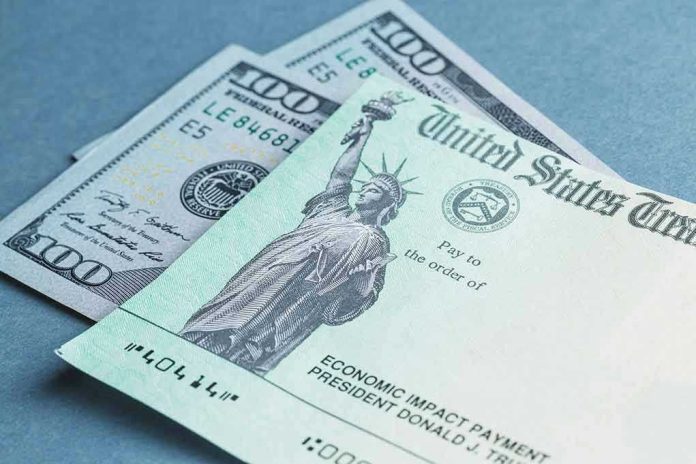
A new Congressional debate over Trump’s proposed tariff rebate checks could mean direct cash for American families—if the Senate approves what critics warn is an inflationary gamble tied to aggressive trade policy.
Story Snapshot
- Trump’s tariff rebate proposal aims to deliver $600 payments per adult and dependent, funded by new tariff revenues.
- The American Worker Rebate Act, introduced by Senator Hawley, formalizes the plan but awaits Senate approval.
- IRS confirms $1,390 checks are being distributed under a separate relief program, not the tariff rebate.
- Fiscal conservatives and economists warn of potential inflation and urge debt reduction instead.
Trump’s Tariff Rebate Proposal: Structure and Funding
In July 2025, President Donald Trump publicly floated the idea of tariff rebate checks as a direct benefit for American taxpayers. The concept draws on the surge in tariff revenue, which hit over $100 billion since new reciprocal tariffs took effect in April. Unlike previous stimulus checks, these rebates would be funded solely from tariff collections, not deficit spending, positioning the proposal as both economic relief and a political signal that Trump’s trade strategy is “paying off.”
The American Worker Rebate Act, championed by Senator Josh Hawley, proposes payments of $600 for each adult and dependent, potentially reaching $2,400 for a family of four. The amount could rise further if tariff revenues increase, directly linking household benefits to Trump’s expanded trade policies. This approach is designed to address concerns about the impact of tariffs on consumer prices by returning some of the collected revenue to families, and underscores the administration’s commitment to putting “America First.”
Legislative Status and Congressional Debate
As of August 17, 2025, the rebate proposal remains in limbo, still awaiting Senate approval. The IRS has confirmed the rollout of $1,390 checks under a separate relief program, but these payments are not the tariff rebate in question. Congressional debate centers on whether the American Worker Rebate Act should divert tariff revenue to direct payments or prioritize debt reduction and other fiscal goals. Opposition senators—including fiscal conservatives like Rand Paul and Bernie Moreno—have voiced strong concerns that the rebates could fuel inflation and undermine long-term fiscal stability.
Political support for the rebate is split, with Trump and Hawley arguing that ordinary Americans deserve a share of tariff windfalls, while critics warn of economic risks. The proposal’s fate hinges on whether Congress believes the benefits to taxpayers outweigh the potential for inflation and increased government spending, with the IRS prepared to implement the program pending legislative approval.
Economic and Political Impact: Inflation, Precedents, and Industry Response
If enacted, the tariff rebate could provide immediate relief to American households, especially those hit hard by rising costs. Supporters claim the payments would help offset higher prices caused by tariffs on imported goods, offering a tangible benefit from Trump’s trade policies. However, fiscal experts and economists caution that injecting billions into the economy could exacerbate inflation, particularly if not balanced by spending cuts or revenue increases elsewhere.
The proposal sets a new precedent by using tariff revenue for direct payments, a departure from past stimulus efforts funded by government borrowing. While some industries—such as domestic manufacturing—may benefit from tariffs, retailers and importers warn of volatility and higher costs. The political stakes are high, with the rebate likely to become a major issue in the 2026 midterms and 2028 presidential race, as both sides claim to defend the interests of American families and workers.
Are we getting a $5000 DOGE dividend or $600 rebate? Fourth stimulus check eligibility https://t.co/xvhkrBEbqq
— Delaware Online (@delawareonline) August 15, 2025
Expert analysis remains divided. Critics argue that rebates funded by tariffs are “extraordinarily inflationary” and fail to address deeper fiscal imbalances. Fiscal conservatives stress the importance of debt reduction, echoing concerns about government overreach and fiscal mismanagement. Supporters counter that returning tariff revenue to affected families is fair and consistent with conservative values of rewarding American workers. With no formal Congressional passage or executive order implementing the rebate as of August 18, uncertainty persists—and Americans are left waiting to see if Trump’s bold promise will materialize into real dollars.









